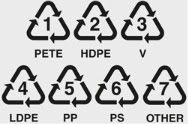 Before you can recycle plastic, you need to know which plastics your recycling company accepts. Surely you have noticed the numbers that appear on the inside of the recycling symbol, right? Those numbers indicate the type of plastic the item is made from. The most common forms of plastic are #1 and #2 and therefor they are easier to recycle. What about the other 5 numbers and what do they all mean? Here is quick breakdown, thanks to earth911.org.
Before you can recycle plastic, you need to know which plastics your recycling company accepts. Surely you have noticed the numbers that appear on the inside of the recycling symbol, right? Those numbers indicate the type of plastic the item is made from. The most common forms of plastic are #1 and #2 and therefor they are easier to recycle. What about the other 5 numbers and what do they all mean? Here is quick breakdown, thanks to earth911.org.
| #1 PET (Polyethylene terephthalate): soda bottles, oven-ready meal trays and water bottles #2 HDPE (High-density polyethylene): milk bottles, detergent bottles and grocery/trash/retail bags #3 PVC (Polyvinyl chloride): plastic food wrap, loose-leaf binders and plastic pipes #4 LDPE (Low-density polyethylene): dry cleaning bags, produce bags and squeezable bottles #5 PP (Polypropylene): medicine bottles, aerosol caps, drinking straws and food containers (such as yogurt, ketchup bottles and sour cream/butter/hummus tubs) #6 PS (Polystyrene): compact disc jackets, packaging Styrofoam peanuts and plastic tableware #7 Other: reusable water bottles, certain kinds of food containers and Tupperware |
As I mentioned, #1 and #2 plastics are the easiest to recycle and most companies accept them. When we still had dual-stream recycling, those were the only 2 plastics we could put in our bins. Now that we have single-stream, we can recycle any numbered plastic. Just another reason why single-stream recycling is so awesome. If you don't have it, see if anyone in your area provides it. I would also like to quickly point out that should avoid plastics #3 and #6 when you can. PVC (#3) contains phthalates and is proving to be more and more toxic every day. Polystyrene (#6) has been linked to neurological issues. #7 category is kind of a catchall for all other plastics that don't fit into categories 1 through 6. It is tricky because many #7 plastics contain BPA while others are safe. If you have #7 plastics that you are unsure of, call the manufacturer to see if they are made with BPA.
Ever wonder how plastic gets recycled? What exactly happens after they get to the recycling plant? Here is a quick video that provides a simple illustration.
Finally, I will leave you with some plastic recycling facts, again courtesy of earth911.org.
|














Great Post. I knew some stuff about plastic but it is so confusing. i remember when Melinda and I were trying to figure out what water bottles were safe to use. Also, we can only recycle #1 and #2 so I will have to look into the single-stream process.
ReplyDeleteI believe Fake Plastic Fish is hosting a green carnival tomorrow and the topic is plastic. You should email her a link to this post! :-)
ReplyDeletevery informative and resourceful - thanks for participating in the carnival!!
ReplyDeletegreat informative post! i recycle through my trash service and I think they are not actually doing it so will probably be looking to do it myself, good to know the ends and outs.
ReplyDeleteGreat post. Lots of good information here!
ReplyDeleteThanks for joining the carnival.
Katy
www.non-toxickids.net